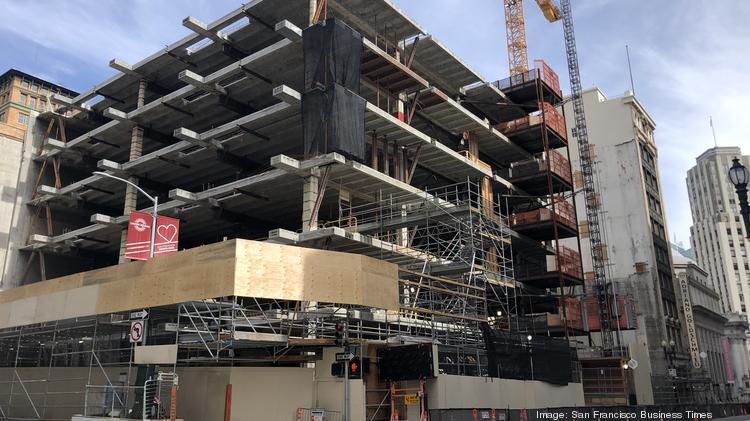Most Bay Area construction banned under revised shelter-in-place orders

The former Macy’s Men’s Store at 120 Stockton in San Francisco is being turned into space for up to six new retailers, two floors of office and a rooftop restaurant. This is how the project looked in March 2020.
A shelter-in-place order issued across six Bay Area counties on March 16 was extended and revised Tuesday with further restrictions — including mass limitations to construction activity — in an effort to prevent the spread of COVID-19.
The joint order by the public health officers of San Francisco, Marin, Contra Costa, San Mateo, Santa Clara and Alameda counties and the city of Berkeley on Tuesday extends the period in which residents are required to shelter in place until May 3.
The revised order, which becomes effective at midnight on March 31, places restrictions on access to recreational areas, requires essential businesses that continue to be operational to create “social distancing” protocols and further limits construction in all six counties and Berkeley, one of three cities in the state with its own public health division.
The previous orders restricted most commercial activity but allowed housing construction — which was considered essential — to continue. Starting at midnight on Tuesday, however, the types of construction that will be allowed through May 3 will be narrowed.
The following types of construction will be allowed to continue: Health care projects directly related to addressing the COVID-19 pandemic; housing and mixed-use projects that include a minimum of 10% affordable units; projects that “provide services to vulnerable populations”; and developments that are required to “maintain the safety, sanitation, and habitability of residence and commercial buildings.” Work necessary to secure an existing construction site that must be shut down will also be allowed for the time being.
“All other construction is prohibited,” the order states.
The new order notes that a county or city’s public health officer may issue further guidance requiring site-specific health and safety plans. In San Francisco, Department of Public Works’ construction projects will be limited to “essential” projects, to be determined by the City Administrator and San Francisco Public Health Officer Tomas Aragon.
The revised order complements a shelter in place order issued by Gov. Gavin Newsom on March 19, according to San Mateo County spokesperson Preston Merchant.
“Every (county) has had to try to reconcile the governor’s ‘Safer at Home’ order with the local counties’ shelter-in-place orders — the way everyone is talking about it is that the more stringent restrictions apply,” said Merchant. He added that in San Mateo County, residents have complained about ongoing construction work that appeared to contradict social distancing and self-isolation orders.
In San Francisco, District 3 Supervisor Aaron Peskin told me that he approached Mayor London Breed’s office after receiving complaints from his constituents about residential construction work that did not appear to be essential by one of the city’s largest landlords, Veritas Investments.
Peskin’s office last Friday was “inundated with emails from Veritas tenants” who had received notifications from Veritas and its property management company, Greentree Properties, “indicating that they were going to commence construction projects” in different locations, including “large apartment buildings that have many, many people sheltering in place,” he said.
He said that the permits issued for the construction work were largely not for “work that was adding any (new) housing.”
“It ranged from turning a studio into a one-bedroom to replacing counter tops with granite counter tops,” said Peskin, alleging that Veritas was “risking their tenants’ and workers’ lives with COVID-19.”
“It’s really about what is truly essential and what is not truly essential work,” said Peskin.
Brad Hirn, a tenant advocate for the Housing Rights Committee, said that tenants received emails at “5:30 p.m. on Friday” stating that Veritas would be resuming what the company described as “essential construction work on Monday morning.”
“Immediately tenants began emailing me and Veritas and said that the essential construction is actually just remodeling vacant apartments and installing washers and dryers — in our view thats exploiting the city’s health order and its ambiguity,” said Hirn.
Veritas said in a statement on Tuesday that construction work never resumed and that the company abandoned plans for scheduled work after hearing from its tenants. Veritas said there is currently no work being done at any of its buildings, and a spokesperson pointed out that the initial health order allowed for construction to continue on existing vacant housing units available for habitation.
“After it was deemed by both the local and state governments that construction to help maintain the continuity of critical infrastructure, including housing, was an essential service, Veritas made the careful decision not to move forward with ‘finish up’ work including light painting and cleaning in its units to be made public,” a Veritas spokesperson said. “However, after taking into consideration a number of expressed concerns Veritas decided not to move forward with the work.”
Other new restrictions added
- San Franciscans are required to adhere to strict social distancing guidelines when leaving their residences.
- Outdoor recreation activities are further limited (activities such as soccer and basketball with anyone outside of a person’s household or unit are now banned) and facilities ordered closed, including picnic areas, dog parks, golf courses, tennis courts and pools.
- Essential businesses must maximize the number of employees who work from home and scale down operations. Businesses that sell food, groceries and cleaning products in combination with nonessential products can only continue to operate if the essential products they sell are a significant part of their business. Essential businesses like banks and grocery stores must prepare, post and implement a written social distancing protocol to protect customers and employees.
- Businesses that supply products needed for people to work from home are no longer considered essential under the order and must close.
- Social distancing is now required in homeless shelters and other facilities, and local governments are urged to provide hand sanitizing stations to the homeless and enforce a 12×12 feet distancing between tents in homeless encampments.
